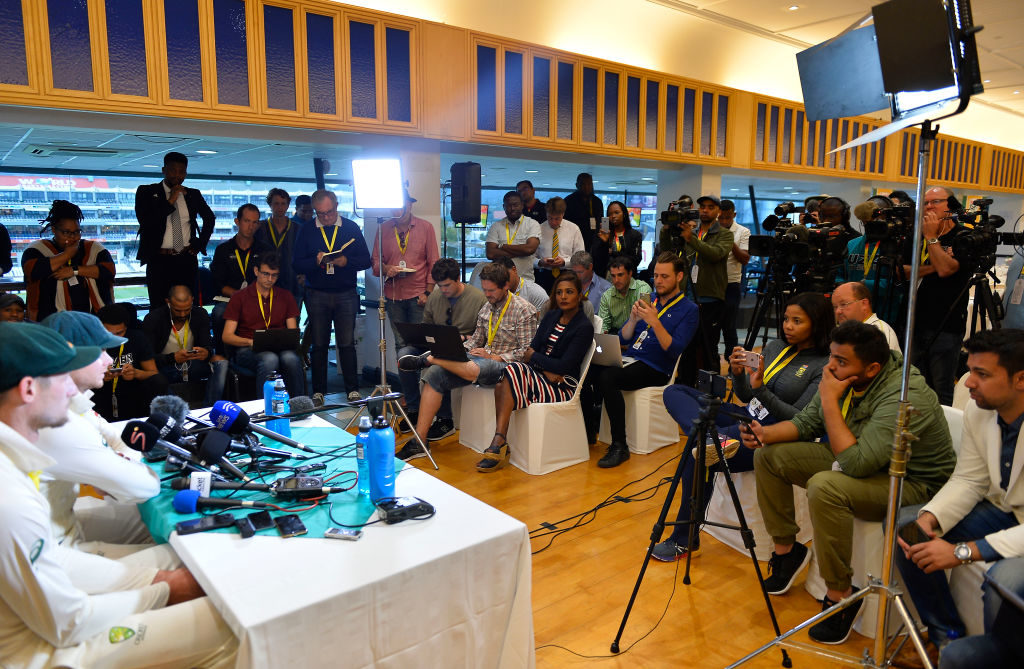SACricketmag.com editor SIMON LEWIS puts a selection of some of the comments made by Cameron Bancroft (from his interview with Adam Gilchrist on Fox Cricket) under the microscope.
As we enter 2019, many people will want to forget about the whole Sandpapergate issue and move along. ‘Let the guys serve their time and get on with life,’ is the sentiment expressed by many people.
I agree. The whole Sandpapergate saga has sickened me and it has captured too much of our attention. However, we learn and grow through the best of times as well as the worst of times, and sometimes we need to take the time to reflect on things said and done. As Bancroft has also just come out with his own comments on what happened over the last nine months, that makes it relevant to dig into what he had to say.
READ ALSO: The scandal of 2018: What Cameron Bancroft had to say for himself
Furthermore, if Bancroft really wanted to ‘just move on’, then I believe he would have said a lot less in the interview and would have been far more humble. There is no doubt in my mind that the Cameron Bancroft/Adam Gilchrist interview was carefully crafted, controlled and manipulated by important stakeholders within the game in Australia, along with a team of well-oiled spin doctors.
In a free society everyone is free to push out their own messages to the world, but as independent media we have a duty to dissect the soundbites and join together any pieces that the public might miss out on that could help them to form a more complete picture of what transpired or was said. We have no agenda other than helping the public form their own balanced opinions about what happens in our cricketing world.
Carefully controlled soundbites pushed into the public domain can be designed and manipulated to change public opinion, most likely with the aim of earning an early end to the debilitating David Warner/Steve Smith bans. The irony of that theory is that, once again, Cameron Bancroft might be being used by those higher up the Australian cricket ladder than him.
The more things change, the more they stay the same!
NOTE: Some of the comments that follow might seem harsh because I have had the luxury of analysing Bancroft’s words carefully, whereas the player was speaking without being able to edit his words (as far as we know). One has to obviously allow him some leeway in this regard as he might well have answered certain questions differently if he had the chance to write his answers with greater care.
READ Read the full transcript of the interview here
Bancroft on the background
BANCROFT: ‘Using sandpaper on a cricket ball was certainly, you know, out of the spirit of the game. But I guess a part of that is you’re trying to take control of a particular part of a game. I can remember on day three that day was pretty dark, pretty gloomy, overcast, it was a bit wet, and I think that was a big part of the reasons that led to, for me to make a really poor decision.’
COMMENT: An honest admission on the face of it, but it highlights a very poor attitude – when things don’t go ‘our way we will do what we need to do to win’, even if it is out of the spirit of the game. He is admitting that was their mindset. Hopefully, that is all in the past.
Bancroft on ‘the why’
BANCROFT: ‘For me, the decision was based around my values, what I valued at the time. And I valued fitting in. At the time did I know any better? No. Because I valued this thing called fitting in, fitting in with the team. Fitting in with my mates, earning respect from, you know, senior players and, I guess, umm … yeah, it led to a really destructive situation. I lost cricket for that period of time.’
COMMENT: This is a bold and frank admission which sounds heartfelt, but it does pose a serious question about him as a person that he would value fitting in so highly so as not be aware of what is right and wrong in the sport he has loved all his life and for which he has worked tirelessly for years in order to earn the right to wear the Baggy Green.
Here is an extract from an article in the West Australian newspaper: ‘Cam Bancroft was such a cricket nerd growing up, his school teammates found him to be the easiest of targets for practical jokes. Even now, Australian cricket’s latest cult hero is so particular about his game that he gets under the skin of his closest teammates. “He’s unlike anyone I’ve ever met before,” housemate and WA teammate Ashton Turner said after Bancroft’s “Headbuttgate” collision with England’s Jonny Bairstow. “He’s one of my best mates and one of the most consummate professionals you’ll ever meet. But he gets on my nerves every now and then as well, so I might threaten a headbutt every now and then just to keep him in line”.’
This was said by someone who knows Bancroft well and who describes him as a consummate professional and (jokingly) suggests you would need to headbutt him to ‘keep him in line’. So that makes it sound like Bancroft is not easily swayed from what he wants to do or what he believes in. Surely as a consummate professional and an Aussie die-hard he would have been repulsed by the thought of cheating? Peer pressure is tough, we all know that … but there is still a massive question mark about why he would ‘do the sandpaper’. Either there were horrendous bullying tactics and manipulation inside the Australian dressing room, or else cheating is endemic within the team and part and parcel of wearing the Baggy Green. This is pure speculation, but it’s the only explanation I can think of.
Bancroft on ‘what if?’
BANCROFT: ‘I’ve asked myself this question a lot – if I had said “no”, if I had said “no”, what would that have meant? And the thing that I’ve enquired and thought about so often myself is if I had said no, and I went to bed that night, I had the exact same problem. I had the same problem that I had using the sandpaper on the cricket ball.’
GILCHRIST: ‘And what’s that problem?’
BANCROFT: ‘The problem was, I would’ve gone to bed, and I would’ve felt like I’d let everybody down. I would’ve felt like I’d let the team down, like I’d hurt our chances to win the game of cricket. And if you actually look at both scenarios, they’re both related to this idea that all I wanted to do was feel, I guess, a sense of value.’
COMMENT: One can sympathise with this line of thinking and understand the dilemma of the young man. What he doesn’t mention is that if Australia had lost the match (which they were on course to do anyway) at least they would still have had a chance of squaring the series at the Wanderers, without himself and Smith and Warner being banned. And, in addition, Australia’s results over the subsequent nine months would obviously have been far better than they have been, which have been miserable. The fact that he DID use sandpaper on the ball actually cost his country in an epic way. Of course, he would not have anticipated this at the time, but the fact that he can’t verbalise this after nine months of introspection is quite surprising.
My guess is that he didn’t say this for one of two reasons.
Presumably, he is looking for our support and understanding, but why he would want understanding now is beyond me, as his ban is over. So why not just move on?
However, what is VERY interesting is that he places the entire emphasis for his actions on the fact that he didn’t want to let the TEAM down. ‘I would’ve felt like I’d let everybody down. I would’ve felt like I’d let the team down,’ he said. This is an incredibly strange comment because only David Warner is supposed to have known ANYTHING about the ball-tampering (skipper Smith knew but ‘didn’t know’).
Bancroft claiming that he would have felt that he would have let the team down must be down to one of two things: either it is clearly an attempt to spin public opinion and sympathy his way (and, by association, to hasten the end of the Warner/Smith bans), or else it is a subconscious admission that, yeah, actually, the whole team was in on it and they all knew and Bancroft was being held up as the man who would make the difference and help Australia win the game. How else could he possibly have felt he was letting the whole team down when only Warner supposedly really knew what he was doing?
Bancroft on if he was asked to do it?
BANCROFT: ‘At the time, yeah, definitely, I was asked to do it. I guess I just didn’t know how to be true to myself in that moment. So, I didn’t actually know any better. Of course, the act of using sandpaper on a cricket ball is wrong, but when you combine with that this value to fit in and to feel valued, to earn respect, I guess this culture, acceptance, this part of culture that people crave, and certainly something that I craved, you can understand how they don’t fit together, those ideas. I am not a victim – I had a choice, and I made a massive mistake. And that’s what’s in my control.’
COMMENT: Hard not to have respect for him here. Sounds heartfelt and devoid of spin.
Bancroft claims he ‘didn’t know any better’
BANCROFT: ‘At the time, Dave (Warner) suggested to me to carry the action out on the ball, given the situation we were in the game. I didn’t know any better. I didn’t know any better because I just wanted to fit in and feel valued, really. Simple as that.’
COMMENT: Not good enough to say he didn’t know any better because he wanted to fit in. I understand he wanted to fit in and possibly the pressure on him was immense. Accepted and easy to feel sorry for him. But don’t say you didn’t know any better BECAUSE you wanted to fit in. Sorry – that’s just lame. Rather own it and say ‘I just wanted to fit in and I screwed up.’ After nine months of introspection, he should have realised that.
Bancroft tries to make good with the umpires
BANCROFT: ‘I actually went in and apologised to the umpires, and I just said, look, I’m really sorry for carrying this out in the game, I’m really ashamed of the actions in itself and it won’t happen again. That’s something that I wanted to do for the game and for, the making up for the mistake – I’m not making up for it, really am I?’
COMMENT: In a moment you think wow, impressive action, but then you also realise in his words ‘it won’t happen again’ that he was just hoping that they would brush it all under the rug. That’s not real remorse, that’s just trying to get out of jail real quick.
Bancroft on the speed of the press conference
BANCROFT: ‘I think, in hindsight, the thing that I was actually proud of in that moment was the fact that Steve and I wanted to be accountable and I guess, really honest about our actions.’
COMMENT: Bancroft wants us to see him as the good guy because he did ‘the right thing’. The problem is that he first did a very, very wrong thing and then, on top of that, he was caught out on camera, live, in front of the world. So ‘wanting to be accountable’ and ‘honest about our actions’ was like bolting the door after the horse was over the hills and far away. You’re caught. It’s like saying you’re going to walk after having all three stumps knocked out of the ground.
Yes, the essence of what he is saying does make one feel empathy for him. A young man and he made a mistake. What is strange is why he would say it now, when his ban is done. What benefit is it to turn public opinion at this stage, unless, of course, the Australian public is still very, very angry about what their boys in Baggy Greens did. Based on chats I’ve had with Australians, my guess is the latter.
Bancroft on the timing
BANCROFT: ‘And there was obviously a lot of opinion about why did that happen straight away? Why didn’t you wait until the next day but I think, as well we probably didn’t anticipate the extremities to which it was going to be reacted on by the public and the media, social media, all this sort of stuff.’
COMMENT: They didn’t realise how wrong they had been and were hoping a quick confession would make everything OK.
Bancroft says his belated admission of his lie is the truth
GILCHRIST: ‘You weren’t sure how wide-ranging this was going to be, is that what led you to say in the press that it was the tape instead of (sandpaper), with a bit of dirt on it?’
BANCROFT: ‘That’s actually really interesting that, because I obviously, … I lied about it, which is the truth.’
COMMENT: Good admission although, again, we know he lied. What is the point of highlighting this, other than to gain sympathy? They don’t deserve sympathy after cheating and lying. Yes, once you do your time then come back and rebuild your life and career and image and the public will understand and forgive over time. Tell us how you’ve grown and changed and share your lessons … don’t stick the sympathy knives in for us to feel sorry for you.
Bancroft claims the world took their eye off the ball
BANCROFT: ‘The issue was actually the fact that I went out with an intentional decision to tamper the ball and I felt like that was forgotten a little bit because people cared what I used on the ball more than the actual reason behind why I was using it. Which I found really, really fascinating.’
ANALYSIS: Here is where a spin doctor has been involved, without question. Trying to lessen the impact of what he did by focusing on where the public and media might have ‘gone wrong’ because he wants us to focus on WHY he did it, which is reminding us that all he ever wanted to do was to fit in with the team and not let the team down.
Gilchrist serves up a half-volley for Bancroft
GILCHRIST: ‘It must be frustrating looking around world cricket and you hear everyone say everyone is doing it, and we’ve seen multiple offenders, some individuals who’ve offended multiple times get hit with a feather. Has that been hard to take?’
COMMENT: This is class PR, but really sad to see Gilchrist involved in it. At this moment in the interview footage of Proteas skipper Faf du Plessis in the Proteas balcony is shown with him miming a ball being ‘scuffed’, with the subtle reference to Du Plessis’ own Mintgate saga being used to try and deflect what Bancroft had done at Newlands. I hate what Faf did with mints, think it was terrible, and I hate the cricketers at all levels who use vaseline and suntan lotion and sugar and all sorts of things to gain an advantage on the field of play. Every one of those players is stealing from cricket when they cross that line.
Regardless of that, what Bancroft did (‘goaded on by Warner) was one of the most despicable things seen on a cricket field (along with any player who has taken bottle caps on to the field to scrape the ball), so putting the focus onto lesser ‘crimes’ (as defined by the ICC) is trying to manipulate the viewer. Why would Gilchrist serve up that half-volley?

Bancroft turns the mirror on the public
BANCROFT: ‘There’s people out there who are forever going to look at me and say “he’s a cheat, he’s the guy that cheated, he’s a cheater” and point the finger and be really, really serious about it, I know there’s going to be people like that forever and I think this idea of forgiveness came to me when a comment was made about that, and I didn’t feel anger, I felt serious compassion. Serious compassion. But, it made me have compassion for someone to kind of go, you know what, like, my mistake probably triggered a lot of stuff in their life. You know, like, when we see other people make mistakes, other people make wrongdoings, I almost feel like the reasons why they emotionally kind of connect with us is because we’ve got something in our own life that actually we’re not proud of. Maybe it hurts us because we’ve actually done that in some way ourselves.’
COMMENT: This is where Bancroft shrewdly turns the mirror on the viewer, and it’s why they call PR the Dark Side. It’s an attempt to manipulate. He’s not owning his crime here and telling us what he has learned – he’s trying to wipe the slate clean by making the public doubt themselves. To my mind, this was his worst moment in the interview and the one where I really lost faith in him.
CONCLUSION
There’s an old saying that you can’t put the genie back in the bottle. Harvey Weinstein, Kevin Spacey, Louis C.K., Bill Cosby and Rolf Harris are just some famous names either found guilty, have admitted guilt or been accused of immoral acts, most of which came to light as a result of the #MeToo movement.
Cricket is just a silly sport in comparison with the tragedies that happen in real life and the injustices people suffer every day, but what is an interesting comparison is that every single one of these celebrities mentioned above will forever be linked with the stigma of sexual harassment. Even after they have served their crime. Bancroft and influencers within Australian cricket don’t seem to appreciate that – or they do, but they want to change public opinion for their own benefit.
It’s awful to see a cricketing ‘tragedy’ like this unfold, but worse to see the lack of genuine remorse or personal growth in the individuals involved, this is terribly sad. It’s a cross these players will have to bear and a weight they will carry in their hearts forever, but for the rest of us it all offers incredible opportunities to learn, and hopefully avoid similar mistakes in our own lives.
Transcript/quotes: Cricket.com.au
Photo: Ashley Vlotman/Gallo Images/Getty Images








